
Journal of Baltic Science Education
Scope & Guideline
Exploring New Frontiers in Science Teaching Methodologies
Introduction
Aims and Scopes
- Interdisciplinary Approaches to Science Education:
The journal promotes the integration of different scientific disciplines and educational methodologies to enhance the learning experience and foster critical thinking among students. - Impact of Technology on Learning:
There is a strong emphasis on exploring how emerging technologies, including AI, virtual labs, and digital learning environments, can improve science education and student engagement. - Teacher Professional Development:
Research on the pedagogical skills and knowledge of science teachers is a key focus, aiming to improve instructional practices and student outcomes in science education. - Student Engagement and Motivation:
The journal investigates factors influencing students' interest in science, including extracurricular activities, inquiry-based learning, and project-based learning. - Assessment and Evaluation in Science Education:
A significant area of research involves developing and validating assessment tools to measure students' understanding, skills, and attitudes in science. - Environmental and Socio-Scientific Issues:
The journal addresses the importance of environmental education and socio-scientific issues, promoting awareness and understanding of global challenges among students.
Trending and Emerging
- Artificial Intelligence in Education:
Recent publications are increasingly exploring the use of AI tools in teaching and learning, highlighting their potential to enhance educational outcomes and personalize learning experiences. - STEM Education Initiatives:
There is a growing focus on STEM (Science, Technology, Engineering, Mathematics) education, particularly in developing curricula and teaching strategies that integrate these fields to foster critical thinking and problem-solving skills. - Environmental Education and Sustainability:
Research addressing environmental issues and sustainability is on the rise, reflecting a global push towards educating students about climate change and their role in creating sustainable futures. - Inquiry-Based and Active Learning:
There is a significant trend towards inquiry-based and project-based learning approaches, emphasizing student engagement and active participation in the learning process. - Digital Learning and Remote Education:
In light of recent global events, research into the effectiveness of digital learning and remote education strategies has surged, focusing on best practices and innovative methods for delivering science education online.
Declining or Waning
- Traditional Teaching Methods:
There is a noticeable decrease in research focused on conventional teaching methods, as the journal increasingly prioritizes innovative and technology-enhanced pedagogies. - Basic Science Concepts without Context:
Research exploring basic scientific concepts in isolation is becoming less prevalent, with a shift towards studies that emphasize contextual and applied learning. - Gender Studies in Science Education:
Although gender differences in science education have been a significant area of interest, recent publications suggest a waning focus on this theme, potentially indicating a shift towards more inclusive and holistic educational approaches. - Single-Discipline Focus:
There has been a decline in studies focusing solely on individual disciplines (like chemistry or biology) without interdisciplinary connections, reflecting a broader trend towards integrated science education.
Similar Journals
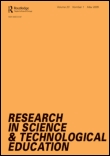
Research in Science & Technological Education
Advancing the Future of STEM EducationResearch in Science & Technological Education, published by Routledge Journals, Taylor & Francis Ltd, is a leading international journal dedicated to advancing the field of education within the realms of science and technology. With its ISSN 0263-5143 and E-ISSN 1470-1138, this prestigious journal provides a platform for innovative and rigorous research from 1983 to the present, thus offering critical insights into pedagogical practices, curriculum development, and policy-making. Boasting a remarkable impact, it ranks in the top quartile (Q1) in both Education and Multidisciplinary categories as of 2023, with an impressive Scopus ranking of #270 out of 1543 in Social Sciences _ Education, placing it in the 82nd percentile. Researchers, educators, and students will find invaluable resources and discussions that shape the future of science and technological education in an increasingly complex world. Although this journal does not offer Open Access, it maintains a strong commitment to disseminating high-quality research, making it an essential read for those invested in the evolution of educational practices and outcomes in the STEM fields.

Asia-Pacific Science Education
Transforming Science Education for a Brighter FutureAsia-Pacific Science Education is a leading academic journal dedicated to advancing the field of science education across the Asia-Pacific region. Published by BRILL, this Open Access journal has been available to the global research community since 2015, ensuring that vital scientific educational discoveries and methodologies reach a broad audience without barriers. With an impressive Scopus rank of #869 in the Social Sciences Education category and classified in the Q2 quartile for 2023, the journal showcases high-quality research that pushes the boundaries of teaching and learning in science disciplines. Scholars, educators, and policymakers alike can benefit from its rigorous analyses and innovative practices aimed at enhancing science education practices and policy in diverse contexts, making it an invaluable resource for driving academic excellence and informed decision-making in education.
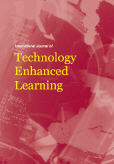
International Journal of Technology Enhanced Learning
Shaping Tomorrow's Education through Technological AdvancementsInternational Journal of Technology Enhanced Learning, published by INDERSCIENCE ENTERPRISES LTD, is a premier scholarly journal that comprehensively explores the intersection of technology and education, fostering innovative approaches to enhance learning processes. Established in 2008 and continuing through 2024, the journal is pivotal for researchers, educators, and technology professionals aiming to disseminate and engage with cutting-edge developments in technology-enhanced learning environments. With an admirable ranking in Scopus—placing in the 72nd percentile of Education and 49th in Computer Science Applications—the journal reflects a robust influence in the fields of Computer Science Applications and Education, as evidenced by its Q2 and Q3 quartile rankings. The journal not only provides a platform for empirical research and theoretical discourse but also emphasizes practical implementations in e-learning. Although it does not offer open access, its curated collection of articles serves as a vital resource for scholars and practitioners who are dedicated to advancing the nexus of technology and education.
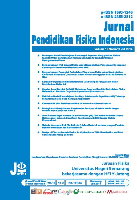
Jurnal Pendidikan Fisika Indonesia-Indonesian Journal of Physics Education
Fostering Global Collaboration in Physics EducationJurnal Pendidikan Fisika Indonesia-Indonesian Journal of Physics Education is a premier open-access journal dedicated to advancing research and pedagogy in the field of physics education. Published by Universitas Negeri Semarang, this journal aims to provide a platform for educators, researchers, and professionals to disseminate innovative teaching practices, empirical studies, and theoretical insights that contribute to the enhancement of physics education globally. With a commitment to accessibility since its inception in 2009, the journal is instrumental in fostering collaboration and knowledge sharing across the international physics education community. The journal not only serves as a vital resource for scholars and practitioners but also plays a significant role in shaping the future of physics teaching and learning in Indonesia and beyond. Researchers and educators are encouraged to submit their manuscripts to engage with the latest trends and research in this dynamic field.
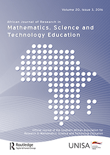
African Journal of Research in Mathematics Science and Technology Education
Bridging Knowledge Gaps in STEM Across the ContinentAfrican Journal of Research in Mathematics Science and Technology Education is a distinguished academic journal, published by Routledge Journals, Taylor & Francis Ltd, dedicated to advancing knowledge in the fields of mathematics, science, and technology education within the African context. With an ISSN of 1811-7295 and an E-ISSN of 2469-7656, this journal has been a crucial platform for scholarly discourse since its inception in 1997, steadily gaining reputation and impact among researchers, educators, and policymakers. The journal features a rigorous peer-review process, ensuring that high-quality research garners visibility across various disciplines, as evidenced by its Quartile rankings in Computer Science Applications, Education, Engineering, Mathematics, and Physics and Astronomy. With its commitment to serving the educational community and fostering innovative practices, the African Journal of Research in Mathematics Science and Technology Education plays a pivotal role in shaping the future of STEM education in Africa and beyond.

Education Inquiry
Innovating research for a transformative educational landscape.Education Inquiry is a leading academic journal published by Taylor & Francis Ltd that has stood at the forefront of educational research since its transition to open access in 2010. With an E-ISSN of 2000-4508, the journal is based in the United Kingdom and focuses on a broad range of topics within the fields of Education, Public Administration, and Sociology and Political Science. Demonstrating its influence and relevance, it has garnered respectable rankings in the Q2 category for Education and Public Administration, and an impressive Q1 ranking in Sociology and Political Science for 2023. The journal is committed to promoting innovative research and critical discourse, making it an essential resource for researchers, professionals, and students alike who seek to deepen their understanding and engage with contemporary educational challenges. With Scopus rankings placing it within the top percentiles across its categories, Education Inquiry continues to contribute significantly to academic excellence and knowledge dissemination in the global community.

International Journal of Education in Mathematics Science and Technology
Transforming educational outcomes through impactful research and practice.The International Journal of Education in Mathematics Science and Technology (ISSN: 2147-611X, E-ISSN: 2147-611X) is an esteemed publication dedicated to advancing knowledge and research in the fields of mathematics, science, and technology education. Published by Necmettin Erbakan University in Turkey, this journal serves as a vital platform for educators, researchers, and professionals to disseminate innovative methodologies, pedagogical strategies, and educational technologies. With a commendable Q2 ranking in both the Education and Mathematics categories for the year 2022, it clearly exemplifies its impact in these domains, boasting a Scopus rank of #19 out of 74 in Mathematics (miscellaneous) and a position in the 75th percentile. Although the journal has transitioned into open access, it remains committed to fostering a rich dialogue among scholars and practitioners dedicated to enhancing educational outcomes in mathematics and science. Researchers and educators interested in contributing to pedagogical advancements are encouraged to submit their work, thereby playing a part in influencing the future of education.

Cadmo
Contributing to the Discourse of Cultural KnowledgeCadmo is a prominent academic journal published by FRANCO ANGELI, specializing in the fields of Cultural Studies, Education, and History. With a long-standing commitment to advancing knowledge from its inception in 2005, the journal has established itself within the academic community, featuring a diverse range of scholarly articles that engage with contemporary issues through a cultural lens. Although it operates without an open access model, Cadmo maintains a solid reputation, positioned in 2023 within the Q3 and Q4 quartiles in various categories, reflecting its ongoing contribution to rich disciplinary dialogues. The journal's rigorous peer-review process ensures high-quality research dissemination, inviting submissions that contribute to theoretical, empirical, and methodological advancements. Researchers, professionals, and students alike will find Cadmo an invaluable resource for insights and developments within its interdisciplinary domains.

GIST-Education and Learning Research Journal
Advancing Knowledge in Education and LearningGIST-Education and Learning Research Journal, published by INST UNIV COLOMBO AMERICANA-UNICA, stands as a prominent vessel for the dissemination of scholarly research in the field of education and learning. Since its inception in 2007, this open access journal has championed the free exchange of knowledge, allowing researchers, educators, and students from around the globe to contribute to and benefit from the latest findings and practices in educational theory and methodology. With its commitment to enhancing educational practices and influencing policy through rigorous research, GIST-Education and Learning Research Journal invites submissions that explore innovative teaching strategies, learning technologies, educational psychology, and related fields. Its accessibility and dedication to quality research make it an invaluable resource for anyone invested in the improvement of educational outcomes.
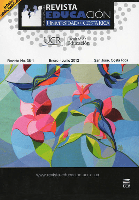
Revista Educacion
Advancing Knowledge for a Brighter Educational FutureRevista Educación is a prestigious academic journal published by Universidad de Costa Rica, Editorial, dedicated to advancing the field of education through scholarly research and innovative pedagogical practices. Established as an Open Access journal since 1977, it aims to provide unrestricted access to high-quality research, fostering a collaborative environment for educators, researchers, and students to share knowledge and insights. With a commitment to addressing contemporary educational challenges in Costa Rica and beyond, Revista Educación serves as a vital forum for disseminating original research articles, case studies, and theoretical discussions that engage a diverse audience. The journal’s dedication to enhancing educational practices makes it an essential resource for those seeking to contribute to the field of education while promoting inclusive and equitable access to educational resources.